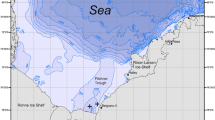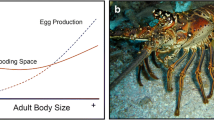Abstract
The function of the fin digging behaviour in increasing food availability for the offspring was analysed in the convict cichlid, Cichlasoma (Archocentrus) nigrofasciatum. Consistent individual differences in the frequency of fin digging were found in the parental fish. Examination of the gastrointestinal tract of young revealed that higher frequency of parental fin digging was associated with higher consumption of large and more profitable prey (Diptera larvae), which inhabited deep horizons of the bottom substrate and possibly were difficult to access without parental assistance. Thus, parental fin digging was initially associated with a significant increase of the offspring growth rate. However, at later brood intervals, when parental care ceased, the young of the high-digging parents were characterised by a poorer consumption of small larvae that were most accessible for them without parental aid and represented an increasingly more important component of their ration than large larvae. Offspring of the low-digging parents, on the other hand, presumably as a result of their individual experience, showed a considerably better consumption of small larvae, increasing their growth rate. As a consequence, prior parental fin digging did not affect the offspring body size after independence. Thus, there exist pronounced individual differences and alternative parental styles in the convict cichlid.
Similar content being viewed by others
References cited
Budaev, S.V. 1997. 'Personality' in the guppy (Poecilia reticulata): a correlational study of exploratory behavior and social tendency. J. Comp. Psychol. 111: 399-411.
Budaev, S.V., D.D. Zworykin & A.D. Mochek. 1999. Individual differences in parental care and behavioural profile in the convict cichlid: a correlation study. Anim. Behav. 58: 195-202.
Clutton-Brock, T.H. 1991. The evolution of parental care. Princeton University Press, Princeton. 352 pp.
Coleman, K. & D.S. Wilson. 1998. Shyness and boldness in pumpkinseed sunfish: individual differences are contextspecific. Anim. Behav. 56: 927-936.
Crowder, M.J. & D.J. Hand. 1995. Analysis of repeated measures. Chapman and Hall, London. 257 pp.
Francis, R.C. 1990. Temperament in a fish: a longitudinal study of the development of individual differences in aggression and social rank in the Midas cichlid. Ethology 86: 311-325.
Keenleyside, M.H.A. 1991. Parental care. pp. 191-208. In: M.H.A. Keenleyside (ed.) Cichlid Fishes: Behaviour, Ecology and Evolution, Chapman and Hall, London.
Krauth, J. 1988. Distribution-free statistics: an application based approach. Elsevier, Amsterdam. 381 pp.
Lavery, R.J. & M.H.A. Keenleyside. 1990. Parental investment of a biparental cichlid fish, Cichlasoma nigrofasciatum, in relation to brood size and past investment. Anim. Behav. 40: 1128-1137.
Magurran, A.E. 1993. Individual differences and alternative behaviours. pp. 441-477. In: T.J. Pitcher (ed.) The Behaviour of Teleost Fishes, Chapman and Hall, London.
Wilcox, R.R. 1987. New designs in analysis of variance. Annu. Rev. Psychol. 38: 29-60.
Wisenden, B.D. & M.H.A. Keenleyside. 1992. Intraspecific brood adoption in convict cichlids: a mutual benefit. Behav. Ecol. Sociobiol. 31: 263-269.
Wisenden, B.D. & M.H.A. Keenleyside. 1994. The dilution and differential predation following brood adoption in free-ranging convict cichlids (Cichlasoma nigrofasciatum). Ethology 96: 203-212.
Wisenden, B.D., T.L. Lanfranconi-Izawa & M.H.A. Keenleyside. 1995. Fin digging and leaf lifting by the convict cichlid, Cichlasoma nigrofasciatum: examples of parental food provisioning. Anim. Behav. 49: 623-631.
Zworykin, D.D. 1998. Parental fin digging by Cichlasoma octofasciatum (Teleostei: Cichlidae) and the effect of parents' satiation state on brood provisioning. Ethology 104: 771-779.
Author information
Authors and Affiliations
Rights and permissions
About this article
Cite this article
Zworykin, D.D., Budaev, S.V. & Mochek, A.D. Does Parental Fin Digging Improve Feeding Opportunities for Offspring in the Convict Cichlid?. Environmental Biology of Fishes 57, 443–449 (2000). https://doi.org/10.1023/A:1007654729430
Issue Date:
DOI: https://doi.org/10.1023/A:1007654729430




